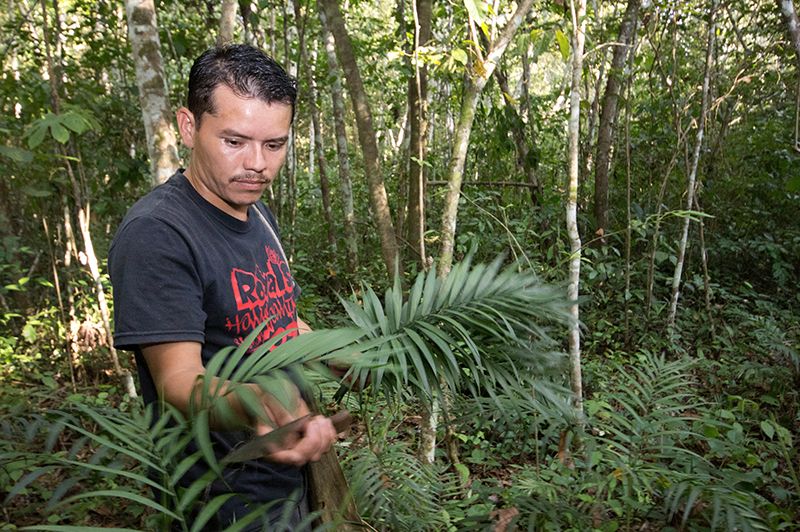From the thematic sectors Forests, Biodiversity and Ecosystems (FBE) and Resilient Food Production (RFP) of the EUROCLIMA+ programme, five messages on the NbS approach for climate action are highlighted
10 March 2021. The second part of the Sixth Assessment Report of the Intergovernmental Panel on Climate Change (IPCC) was released on 28 February. In total, 270 authors from 67 countries and more than 675 collaborators examine the impacts of climate change on nature and people around the globe to provide governments at all levels with scientific information they can use to shape climate policy.
Since 1988, the IPCC, a United Nations agency, has regularly provided scientific assessments of climate change to policy makers. It consists of three working groups that investigate and report on I) the physical science, II) impacts, adaptation and vulnerability, and III) climate change mitigation.
The Summary for Policymakers of the IPCC Working Group II Report, "Climate Change 2022: Impacts, Adaptation and Vulnerability", was adopted by 195 IPCC member governments in a virtual meeting on Sunday 27 February 2022, a process that faced delays due to the COVID-19 pandemic.
From the thematic sectors Forests, Biodiversity and Ecosystems (FBE) and Resilient Food Production (RFP) of the EUROCLIMA+ programme, we highlight 5 key messages on the Nature-based Solutions (NbS) approach to climate action that stand out from the report for their potential to contribute to strengthening public climate policies in the region.
- The authors of the study note with great confidence that "nature-based solutions cannot be considered an alternative to, or a reason to delay, deep cuts in greenhouse gas emissions".
- The report states with high confidence that nature-based solutions "provide climate change adaptation and mitigation benefits, and also contribute to other Sustainable Development Goals" (SDGs).
- They recognise that their definition excludes actions that use nature to "solve human problems, but do not provide benefits to biodiversity". The authors also state that NbS are "themselves vulnerable to the impacts of climate change".
- Another very important observation is that "poorly conceived and designed" nature-based mitigation projects have the potential to have multiple negative impacts, the report states, such as creating or exacerbating competition for land and water resources, "reducing human wellbeing" or failing to provide mitigation "that is sustainable over the long term".
- Furthermore, for NbS to succeed, it is "critical" that they support local livelihoods: "Indigenous and local communities and millions of private landowners" must benefit from and actively participate in NbS decision-making (source: CarbonBrief).
Some examples of NbS approaches from the FBE and RFP sectors contributing to climate action in the region are:
Ecosystem-based adaptation and mitigation: Tree planting and good landscape management in agricultural and livestock areas protects people against flash floods caused by heavy rainfall and increases carbon sinks.
Ecosystem restoration / Ecological and landscape restoration: The protection of water sources increases biodiversity, optimises a locality's land use and contributes to its sustainable development.
Ecosystem protection and protected area management: The protection of natural areas generates sources of employment through ecotourism and the bioeconomy.
Promoting natural infrastructure: Natural floodplain restoration reduces disaster risk, improves water quality and creates recreational spaces that contribute to people's health and well-being.
From the EUROCLIMA+ programme, in the thematic sectors FBE and RFP, we have supported 19 projects in 14 countries in Latin America and the Caribbean that strengthen the resilience of ecosystems, agricultural systems and vulnerable populations in the face of climate change. As a result, they add to job creation, reduce climate risks and address biodiversity loss in the region.
About EUROCLIMA+
EUROCLIMA+ is a programme funded by the European Union and co-financed by the German federal government through the Federal Ministry for Economic Cooperation and Development (BMZ), as well as by the governments of France and Spain through the Ministry of Foreign Affairs, European Union and Cooperation.
The Programme's mission is to reduce the impact of climate change and its effects in 18 countries in Latin America and the Caribbean, promoting mitigation, adaptation, resilience and climate investment. It is implemented according to the "Spirit of Team Europe" under the synergistic work of seven agencies: the Spanish Agency for International Development Cooperation (AECID), the French Development Agency (AFD), the Economic Commission for Latin America and the Caribbean (ECLAC), Expertise France (EF), the International and Ibero-America Foundation for Administration and Public Policy (FIIAPP), the German Society for International Cooperation (GIZ) GmbH, and the UN Environment Programme (UNEP).
For information about the actions of EUROCLIMA+ on the topic of Nature-based Solutions contact Mauricio Luna Rodríguez This email address is being protected from spambots. You need JavaScript enabled to view it.

